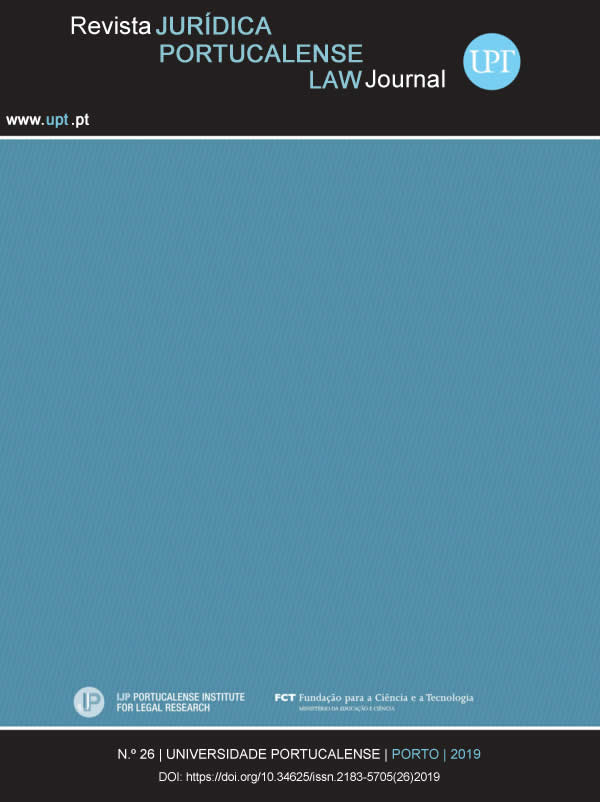A Retirada Unilateral de uma Notificação de Saída e o Silenciamento da União Europeia
Resumen
Este artigo pretende analisar a questão relativamente à possibilidade de um Estado-membro da União Europeia revogar a sua notificação de retirada. A questão é pertinente em virtude de estarmos a assistir ao desenrolar do “Brexit” e pelo facto de em dezembro 2018 o Tribunal de Justiça da União Europeia ter decidido uma questão prejudicial – Processo C-621/18 Wightman and Others v. Secretary of State for Exiting the European Union – que pretendia saber se o Reino Unido podia retirar unilateralmente a sua notificação de saída à luz do Artigo 50º do Tratado da União Europeia. O problema deriva do facto daquele preceito não resolver a questão e haver uma multiplicidade de interpretações acerca da validade de uma eventual alteração de posicionamento de um Estado-membro. A solução a dar à lacuna divide a doutrina. Por um lado, existem autores que negam essa possibilidade. Por outro lado, há autores que admitem tal possibilidade e para tanto recorrem ao direito constitucional, ao direito internacional e ao direito europeu. Na sua decisão o TJUE optou pela via do Direito da União Europeia para admitir a retirada unilateral de uma notificação de saída sem qualquer tipo de restrição. No entanto, tal entendimento silencia a União Europeia.
Citas
BARATA, Mário Simões. Formas de Federalismo e o Tratado de Lisboa: Confederação, Federação e Integração Europeia. Coimbra: Almedina, 2016. ISBN 978-972-40-6060-6.
CARMONA, Jesús, CÎRLIG, Carmen-Cristina, SGUEO, Gianluca. UK withdrawal from the European Union: Legal and procedural issues. European Union, 2017. ISBN 978-92-846-0818-8.
CRAIG, Paul. Brexit: What Next? Brexit: A Drama in Six Acts. European Law Review, August 2016, vol. 41, p. 447-468. ISSN 0307-5400.
DONY, Marianne. Droit de l’Union Européenne. Bruxelles: Editions de L’Université de Bruxelles, 2010. ISBN 978-2-8004-1478-2.
EECKHOUT, Piet, FRANTZIOU, Eleni. Brexit and Article 50 TEU: A Constitutionalist Reading. Common Market Law Review, 2017, vol. 54, p. 695-734. ISSN 0165-0750.
FRIEL, Raymond J. Providing a Constitutional Framework for Withdrawal from the EU: Article 59 of the Draft European Constitution. International and Comparative Law Quarterly, April 2004, vol. 53, p. 407-428. ISSN 0020-5893.
FRIEL. Raymond J. Secession from the European Union: Checking out of the Proverbial “Cockroach Motel”. Fordham International Law Journal, January 2004, vol. 27, p. 590 – 640. ISSN 0747-9395.
HERBST, Jochen. Observations on the Right to Withdraw from the European Union: Who are the “Masters of the Treaties”? German Law Journal, 11 2005, vol. 6, p. 1755-1760. ISSN 2071-8322.
HILLON, Christophe. Accession and Withdrawal in the Law of the European Union. In ARNULL, Anthony, CHALMERS, Damian (eds). The Oxford Handbook of European Union Law. Oxford: Oxford University Press, 2015, p. 126-152.
HOFMEISTER, Hannes. Should I Stay or Should I Go? – A Critical Analysis of the Right to Withdraw from the EU. European Law Journal, 5 2010, vol.16, p. 589-603. ISSN 1468-0386.
HOUSE OF LORDS EUROPEAN UNION COMMITTEE. The process of withdrawing from the European Union, HL Paper 138. UK Parliament, 4 May 2016 (consultado em novembro 2019). Disponível em www.parliament.uk
LAZOWSKI, Adam. Withdrawal from the European Union and alternatives to membership. European Law Review, 5 2012, vol. 37, p. 523-540. ISSN 0307-5400.
LOUIS, Jean-Victor. Le Droit de Retrait de L’Union Européene. Cahiers de Droit Européen, 5-6:2006, vol. 45, p. 293-314. ISSN 0007-9758.
MALATHOUNI, Eliza. Should I Stay or Should I go: The Sunset Clause as Self-Confidence or Suicide. Maastricht Journal of European and Comparative Law, 2008, vol. 15, p. 115-124. ISSN 1023-263X.
PAPAGEORGIOU, Ioannis. The (ir-)revocability of the withdrwal notification under Article 50 TEU. European Union, 2018. ISBN 978-92-846-2530-7.
SARI, Aurel. Reversing a Withdrawal Notification under Article 50 TEU: Can a Member State Change its Mind? European Law Review, 4 2017, vol. 41, p. 451-473. ISSN 0307-5400.
TATHAM, Alan F. Don´t Mention Divorce at the Wedding Day, Darling!: EU Accession and Withdrawal after Lisbon. In BIONDI, Andrea, EECKHOUT, Piet, RIPLEY, Stefanie (eds). EU Law After Lisbon. Oxford: Oxford University Press, 2012, p. 128-154.
WYROZUMSKA, Anna. Article 50 [Voluntary Withdrawal from the Union]. In BLANKE, Hermann-Josef, MANGIAMELLI, Stelio (eds.). The Treaty on European Union (TEU): A Commentary. Heidelberg: Springer, 2013, p. 1385-1418.
WYROZUMSKA, Anna. Withdrawal from the European Union. In BLANKE, Hermann-Josef, MANGIAMELLI, Stelio (eds.). The European Union after Lisbon: Constitutional Basis, Economic Order and External Action. Heidelberg: Springer, 2012, p. 343- 365.
Descargas
Publicado
Cómo citar
Número
Sección
Licencia
Authors who published in the journal agree to the following terms:
- The Authors grant the Journal the right of first publication, and other non-exclusive publishing rights, licensed under the Creative Commons Attribution License which allows the sharing of work with recognition of its initial publication in this journal.
- Authors are able to take on additional contracts separately, non-exclusive distribution of the version of the paper published in this journal (ex .: publish in an institutional repository or as a chapter in a book), with an acknowledgement of its initial publication in this journal.
- Authors are permitted and encouraged to post and distribute their work online (eg .: in institutional repositories or on their website) at any point before or during the submission process, as it can lead to productive exchanges, as well as increase the impact and the citation of published work (See The Effect of Open Access).
RJP does not apply submission, publication or any other fees of any nature. Its articles are open access, with the goal of disseminating scientific knowledge and the debate of legal topics in the area of Legal Sciences.






